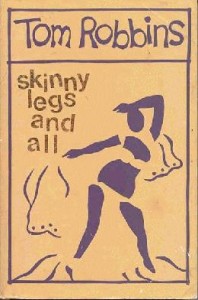 Clever For the Sake of Cleverness
Clever For the Sake of Cleverness
Robbins, Tom (1990). Skinny Legs and All. New York: Bantam.
This novel is about Tom Robbins, who wants to show you how clever, funny, and sophisticated he is. With respect to that goal, the book succeeds.
However, does he create and motivate interesting characters? No. Does he develop an interesting story? No. Does he elucidate some significant point? No. Does he create a haunting sense of place or time? No. Does he skewer social or political practices with satire or parody? Maybe a little.
After reading this book, I felt like I had watched a TV sitcom. I chuckled and guffawed, then realized I just wasted precious hours of my life. Is there anything to learn from this novel? Perhaps only that some people are good at remote associations, and if you think those are funny, this book is for you. I do happen to enjoy nonsequiturs, sequences of unexpected thoughts or images that have absolutely no relation to each other, so there were plenty of giggles for me.
For example, how would you complete this simile: “It was empty as …”? I might have said, “…a church at noon,” or “…an ice cream parlor at the North Pole,” or some such. I don’t think, even if I were smoking something, I could have come up with, “a paraplegic’s dance card.”
Funny? Yes, but only because of its extreme low frequency, not because the idea itself is funny. It is clever for the sake of cleverness. Often, Robbins’ comparisons are funny even when they make no sense at all. Consider this description of a sunrise that was “…like a neon fox tongue lapping up the powdered bones of space chickens…” What? I chuckled, but this is pointless, goofball humor. The ideas themselves are not funny, only their remoteness and juxtaposition are funny.
Once in a while, Robbins hits gold with an apt comparison, like calling the waning daylight of late afternoon “lame duck daylight,” or describing a woman as being “on the dry side of thirty.” My favorite might have been a description of a man’s gaudy, mismatched clothing making a character feel as though she was being “pistol-whipped with a kaleidoscope.” There were enough of these truly creative – not just clever, but artistically creative – sentences to keep me turning the pages.
There are two and a half parallel stories in the novel. In one, a young redneck couple makes a pilgrimage to New York city in an airstream trailer that the guy, Boomer, a skilled welder, has made look like a roast turkey. His wife, Ellen Cherry, will strive to make it as an artist in the Big Apple. She doesn’t make it, but ironically, Boomer does, as his trailer/turkey becomes the toast of the avant-garde.
In the second story, five inanimate objects are on a pilgrimage from the U.S. to Jerusalem. They are, a can of beans, a dirty sock, a silver dessert spoon, a conch shell and a painted stick. Some have distinguishable personalities. Can o’ Beans, for example, tends to “fart with curiosity,” whereas Spoon thinks of herself as a Southern lady of taste and breeding. The objects have endless adventures of no consequence. For example, dirty sock gets washed away in a river, but somehow reunited with his colleagues. Funny? No. Clever for the sake of cleverness, is what I say.
The final half-story is about a cartoony, television preacher who wants to blow up Jerusalem’s Dome of the Rock, to cause World War Three, and hasten the Rapture. It’s a thin character with a thin story, but Robbins uses it in the last quarter of the book to create a theme of apocalypse and End Times, satirically symbolized by a Super Bowl game.
Throughout, Robbins attempts to comment on middle-east politics. Ellen Cherry works at an Israeli-Arab restaurant across from the U.N., giving the author ample scope for commentary on middle-east politics. Robbins’ heavy-handed lectures about the history and politics of religion and on Israel in particular, are not interesting or informative. In the ultimate scene, his half-baked philosophical commentary morphs into a lecture about human self-delusion in general. Never has a novel ended with a more resounding thud.
There’s no denying Tom Robbins has his fans. His books are widely praised and wildly popular, so somebody likes them. I found this one mildly amusing, but ultimately disappointing for lack of substance or even sustained entertainment.
